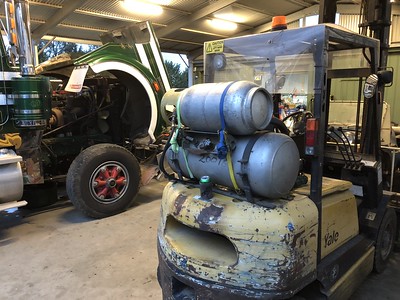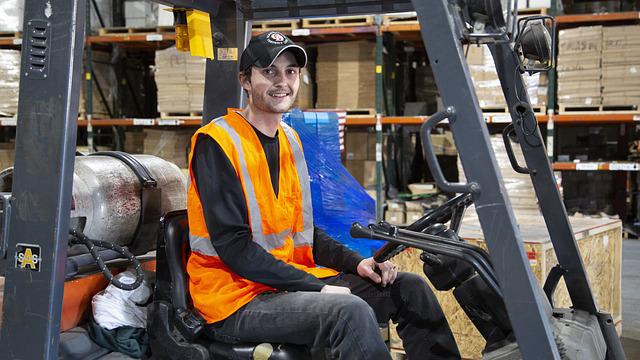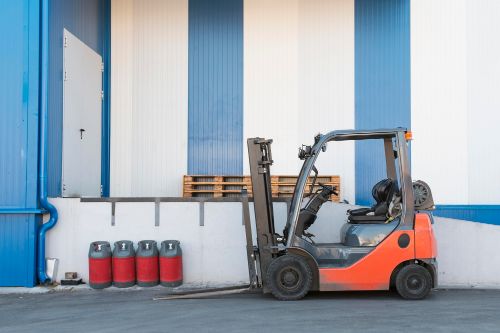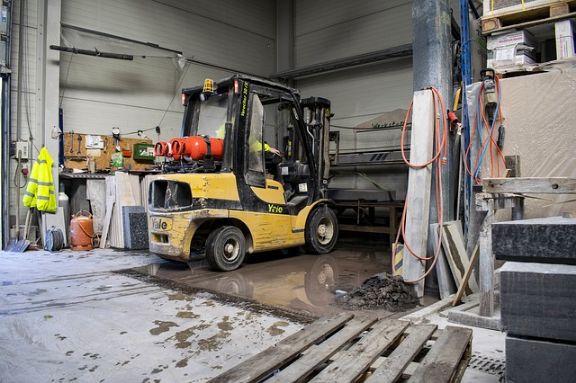
Forklifts and propane tanks are both common pieces of equipment on many job sites. But can a forklift propane tank be used for a heater?
Yes, a forklift propane tank can be used for a heater, given it’s compatible with the heater’s specifications. However, it’s critical to ensure proper setup and safety precautions. Always ensure that the tank is securely attached, the connections are tight and leak-free, and the heater is designed to run on propane. Professional installation is advised to ensure safety and efficiency.
However, there are various technical, safety, and legal considerations to address before doing so.
1. Technical Considerations:
- Pressure Specifications: Forklift propane tanks are designed for specific pressure requirements suitable for forklift operations. While they may functionally work with a heater, it’s important to ensure that the pressure specifications of the tank align with the heater’s requirements.
- Connection Types: Forklift propane tanks might have different valve or connector types than those commonly found on tanks designed for heaters. Adapters may be needed, but using them can introduce potential failure points or compatibility issues.
2. Safety Concerns:
- Using a tank for a purpose other than its original design can introduce risks. There might be potential dangers of incorrect pressure or connections leading to leaks or even explosions.
- If not secured properly, the tank’s positioning or the way it’s connected to the heater could introduce hazards, especially if it’s more prone to tipping or if it’s located near ignition sources.
3. Economic and Practical Implications:
- Even though it might seem cost-effective to use an available forklift propane tank, potential complications or the need for additional hardware could offset the savings.
- Consider the frequency and ease of refilling. Some refilling stations might be hesitant or refuse to fill a forklift tank if it’s known to be used for heating due to liability concerns.
4. Legal Implications:
- Many jurisdictions have specific regulations governing the use of propane tanks. Using a forklift propane tank for a heater might violate local, state, or national regulations. Non-compliance can result in fines, voided insurance, or legal liabilities in case of accidents.
5. Environmental Impacts:
- While propane is a clean-burning fuel, using a tank not designed for a specific purpose could potentially lead to incomplete combustion or inefficiencies, leading to more emissions.
While it is technically feasible to use a forklift propane tank for a heater, it’s crucial to evaluate the entire scope of implications. Before proceeding, consult with experts, review local regulations, and ensure that all safety precautions are meticulously followed. For most individuals and businesses, sticking to tanks designed for the intended purpose is the safest and most hassle-free choice.
Types of Propane Tanks
Propane, a versatile and widely used fuel, is stored and transported in various types of tanks designed for diverse applications. Among these, the forklift propane tank is unique in its design and purpose. Let’s delve into its specifics and compare it to tanks intended for heating.
Forklift Propane Tank:
- Size: Forklift propane tanks typically hold around 33 pounds (about 8 gallons) of liquid propane. This capacity is suitable for powering forklifts for several hours, depending on the intensity of use and the forklift’s efficiency.
- Design: These tanks have a few distinct design features. One notable characteristic is their horizontal orientation, which differs from many other propane tanks that are stored vertically. They often come with a built-in gauge to indicate fuel level and may have a vapor withdrawal valve. Their shape is usually cylindrical, and they often have a collar with handles, making it easier to install and remove from the forklift.
- Intended Use: As the name suggests, these tanks are designed specifically for forklifts. They provide the energy necessary to power the forklift’s engine, allowing it to lift, transport, and place loads in various settings, from warehouses to construction sites.
Propane Tanks for Heating:
- Size: Heating tanks come in various sizes, ranging from smaller ones (like 20-pound grill tanks) to large residential tanks that can hold several hundred or even a thousand gallons of propane. The size chosen often depends on the heating demands of the space or application.
- Design: Residential and commercial heating tanks are typically designed to stand vertically. They can be above-ground or underground. Their design includes a pressure relief valve, a liquid withdrawal valve, and a gauge. Some larger tanks might also have a fill valve and a vapor return valve. The tanks meant for grills or smaller applications are usually portable, while the larger ones are stationary.
- Intended Use: These tanks are designed to fuel appliances and systems that provide heat. This includes home furnaces, water heaters, fireplaces, space heaters, and even large-scale commercial and industrial boilers. The propane stored in these tanks combusts cleanly and efficiently, offering a reliable source of heat.
Comparison:
- Orientation and Design: Forklift tanks are typically horizontal, while many heating tanks, especially the smaller ones, are vertical. The design features, such as handles on forklift tanks, make them distinct.
- Capacity: Forklift tanks have a relatively standard size, while heating tanks can vary widely based on the application’s requirements.
- Intended Use: While both types of tanks store propane, their end uses are very different. A forklift tank powers machinery, whereas heating tanks provide warmth to spaces or water.
- Connection and Hardware: The valves and connectors might differ between the two types, with forklift tanks possibly requiring different hardware or adapters if used for any other purpose.
While both forklift propane tanks and heating propane tanks serve as vessels for storing propane, their design, size, and intended use vary. Care should be taken not to interchange their purposes without thorough investigation and adherence to safety protocols.
Technical Considerations If You Are Intending to Use Forklift Tank for Heating
When assessing the feasibility of using propane tanks across different applications, it’s critical to understand the technical nuances that differentiate them. Two of the most crucial considerations are the pressure specifications of the tank and the types of connections they employ. Here’s a deeper dive into these aspects for forklift propane tanks and heater-specific tanks.
1. Pressure Specifications:
- Forklift Propane Tanks:
- These tanks are designed to deliver propane at a consistent pressure suitable for the engine requirements of forklifts.
- Generally, the pressure inside a propane tank, regardless of its use, is influenced by the temperature. As propane is stored in its liquid form, it vaporizes to gas as it’s drawn from the tank. This vaporization process depends on the temperature: the higher the temperature, the higher the pressure inside the tank.
- For forklift tanks, it’s crucial that they maintain a steady vaporization rate to ensure the forklift engine receives a consistent fuel supply.
- Heater-Specific Tanks:
- The pressure requirements for heaters can vary based on the type and model of the heater. Some heaters, especially those designed for residential use, might operate at lower pressures compared to industrial heaters.
- Just like forklift tanks, the pressure inside heating tanks is also influenced by temperature. However, these tanks might be equipped with regulators that ensure the propane is delivered at the desired pressure for the heater.
- Comparison:
- While the internal pressures within the tanks might be similar due to propane’s properties, the output pressures, especially once passed through any built-in regulators or valves, might differ. Using a tank with an incorrect output pressure can result in inefficiencies or potential safety hazards.
2. Connection Types:
- Forklift Propane Tanks:
- These tanks often employ specialized connectors designed for quick and easy attachment and detachment, facilitating rapid tank swaps during operations.
- Many forklift tanks use a “quick-connect” type fitting, which might be different from the threaded connections found on other propane tanks.
- Heater-Specific Tanks:
- Heating tanks typically come with standard POL (Prest-O-Lite) or ACME threaded connections. Residential heaters, for example, might use a Type 1 or “QCC” (Quick Closing Coupling) connection, recognizable by its external threads.
- Larger, commercial heaters might have different connectors or might even draw liquid propane directly, requiring specialized fittings.
- Comparison:
- The connection types between forklift and heater tanks can differ significantly. Adapting one to the other might require special fittings or adapters. However, using adapters can introduce points of failure or leakage, so they should be used with caution and regularly inspected for wear and tear.
Both forklift propane tanks and heater-specific tanks store and deliver propane, their technical specifications regarding pressure and connections can differ significantly. If considering repurposing or interchanging these tanks, always consult with industry professionals and adhere strictly to safety guidelines and regulations.
Safety Concerns to Take Note Of
Utilizing propane tanks outside their intended purpose can introduce a host of safety concerns. The risks are magnified when dealing with compressed gases, as even minor oversights can result in significant hazards. Here’s a detailed look at the safety concerns tied to using non-standard propane tanks.
1. Risks of Using a Non-Standard Tank for an Unintended Purpose:
- Material Incompatibility: Tanks designed for specific purposes might have materials or coatings suitable for those conditions. Using them in other environments might lead to faster wear, corrosion, or other forms of degradation.
- Stress and Wear: Tanks designed for certain applications may not be equipped to handle the stresses or usage patterns of other applications. For instance, a tank designed for intermittent use might wear out faster if used continuously.
- Instability: The physical design of certain tanks, such as the horizontal orientation of forklift tanks, might make them unstable or unsuitable for other applications.
2. Potential Dangers of Incorrect Pressure or Connections:
- Gas Leaks: Improper connections or incompatible connectors can lead to propane leaks. Even minor leaks can pose inhalation risks and, more critically, create an explosive environment.
- Over-Pressurization: Using a tank outside its pressure specifications can result in over-pressurization. If the tank’s safety relief valve fails or is inadequate for the increased pressure, the tank can rupture.
- Incomplete Combustion: If a heater receives propane at a pressure it’s not designed for, it can lead to incomplete combustion. This not only wastes fuel but also produces carbon monoxide, a deadly gas.
- Explosions: Incorrect connections or faulty pressure settings can lead to gas build-ups and, in the presence of an ignition source, result in explosions.
3. Safety Regulations and Guidelines: What Industry Standards Say:
- National Fire Protection Association (NFPA): NFPA 58, known as the “Liquefied Petroleum Gas Code,” provides comprehensive regulations and safety guidelines for propane storage, handling, and transportation. This standard addresses tank specifications, installations, and more.
- Occupational Safety and Health Administration (OSHA): OSHA has regulations concerning the safe handling and storage of propane in various settings, ensuring worker safety.
- Transportation Regulations: There are specific guidelines for transporting propane tanks, especially concerning their condition, labeling, and securing methods.
- Local Building and Fire Codes: Many jurisdictions have local building or fire codes that dictate the installation, storage, and use of propane tanks, often adopting or referencing NFPA standards.
- Industry Best Practices: Beyond official regulations, industry groups and associations often provide best practices, training, and certifications related to propane safety.
The versatility of propane makes it a valuable fuel source across diverse applications, safety should always be the paramount concern. Using tanks outside their designed purpose can introduce severe risks. Always consult with professionals, stay informed of industry standards, and prioritize safety over convenience or cost savings.
Economic and Practical Implications in Repurposing Forklift Tank
1. Cost-effectiveness: Is using a forklift propane tank for heating financially wise?
- Initial Savings: At first glance, using an available forklift propane tank might seem economical, especially if one is already on hand and not in use.
- Hidden Costs: However, the need for adapters, special connectors, or regulators to make the tank compatible with heating equipment can introduce additional expenses. Furthermore, frequent checks, maintenance, or repairs stemming from using a non-standard tank might negate any initial savings.
- Operational Efficiency: There’s also the matter of operational efficiency. A mismatch in pressure specifications could lead to wasteful propane consumption, further driving up costs in the long run.
2. Availability and Ease of Refilling:
- Refilling Stations: Some propane suppliers or refilling stations might be hesitant or outright refuse to fill a forklift tank if it’s known to be used for heating purposes. This is often due to safety concerns or potential legal liabilities.
- Frequency: If a forklift tank’s capacity doesn’t align with the heating needs, it might require more frequent refills compared to a standard heating tank, adding to the inconvenience and potentially the costs.
Legal Implications
1. Local, state, or national regulations on propane tank usage and repurposing:
- Usage Restrictions: Many jurisdictions, from local to federal levels, have strict regulations on how propane tanks are to be used. These regulations ensure that tanks are operated within safe parameters and reduce the risks of accidents.
- Repurposing Restrictions: Repurposing a tank for another function might not only be unsafe but also illegal in many areas. For instance, converting a forklift propane tank for home heating could violate building or fire codes.
2. Consequences of not adhering to regulations:
- Legal Penalties: Non-compliance with regulations can result in hefty fines, penalties, or legal actions against individuals or businesses.
- Insurance Voidance: Insurance policies, whether for homes or businesses, often stipulate adherence to local and national regulations. Using propane tanks inappropriately can void these policies, leading to significant financial losses if there’s property damage or injuries.
- Liability Issues: In the event of an accident or incident resulting from the misuse of a propane tank, the individual or business could be held liable for damages, which might result in costly lawsuits or compensation claims.
Risks and Dangers of Improper Use of Propane Tanks in Applications Not Intended To
Improper use of propane tanks, especially in applications they’re not designed for, can lead to severe consequences. Here are some of the main risks and dangers associated with such misuse:
- Risk of Explosion or Fire: Propane is a highly flammable gas. If a tank is improperly installed or used in a device it’s not designed for, there’s an increased risk of leaks, which could potentially lead to an explosion or fire if ignited by a spark or flame.
- Carbon Monoxide Poisoning: Propane heaters, when operated improperly or used in poorly ventilated areas, can produce carbon monoxide (CO)—an odorless, colorless, and tasteless gas. Overexposure to CO can cause headaches, dizziness, vomiting, or even death in severe cases.
- Equipment Damage: Using a forklift propane tank in a heater could potentially damage the heater itself. This can result in malfunctions or failures that might endanger users or those nearby.
- Legal Consequences: In many places, using equipment in a manner not consistent with its design or intended use may violate local codes or laws. Such violations could lead to fines, penalties, or legal responsibility for any damage or injury caused.
- Health Risks: In the event of a leak or a failure, exposure to propane gas can lead to several health issues, including respiratory problems, nausea, and in extreme cases, asphyxiation.
- Waste of Resources: Improper use of propane tanks often leads to inefficient operations and a waste of resources, which can translate to higher costs and environmental impact.
To mitigate these risks, always use propane tanks as they’re intended, in compliance with manufacturer instructions and safety guidelines. Always have regular inspections and maintenance, and never hesitate to consult a professional if you’re unsure. It’s far better to invest in the right equipment for your needs than to risk the dangers of improper use.
In Conclusion
The question of whether a forklift propane tank can be used for a heater is one that involves a deep understanding of the technical specifications and safety considerations of both devices. Although both rely on propane as a fuel source, they are designed with specific purposes in mind. Our exploration of this topic has revealed the crucial differences and similarities between the design, function, and safety features of forklift propane tanks and propane heaters.
However, one must always prioritize safety and legal compliance. Given the potential risks and regulatory constraints, it is typically not advisable to use a forklift propane tank for a heater without professional guidance. If you find yourself considering such an option, always consult with industry experts to make informed and safe decisions.
Furthermore, ensuring proper use and maintenance of propane tanks is vital regardless of their specific applications. Regular checks, adherence to manufacturer guidelines, and understanding best practices are keys to safe propane use.
Remember, every piece of equipment comes with its own set of rules and instructions. Therefore, swapping components without professional knowledge can lead to dangerous situations. In all circumstances, safety should be your primary concern. Stay safe, and make smart, informed decisions about your propane use.
So, the next time you think about repurposing a forklift propane tank for a heater, consider the information shared in this article, weigh your options carefully, and seek professional advice to ensure your actions are safe and within regulations.

Mike is an experienced propane technician with over 15 years of professional experience in the field. He has dedicated his career to helping customers with their propane needs, from installation to maintenance and repair. Together with Jeremy, he co-founded this website to provide useful information and guidance to customers seeking reliable propane services.



